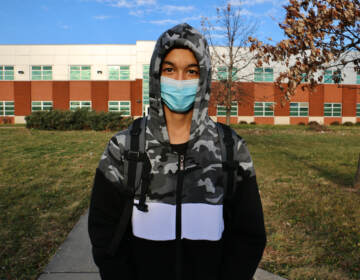Philly sues AG Sessions to keep funding now under threat by ‘sanctuary city’ status
ListenRead the lawsuit below:
Philadelphia officials are suing U.S. Attorney General Jeff Sessions in federal court over “unlawful” grant conditions that punish it as a so-called sanctuary city.
Since the Justice Department announced last month it was adding new restrictions to certain grant programs in an attempt to force cities to comply with federal immigration authorities, four other jurisdictions — including Chicago and Los Angeles — have sought to block the grant requirements by taking Sessions to federal court.
The funding in question, an Edward Byrne Memorial Justice Assistance Grant , also known as the JAG Program, supports police overtime, court equipment and juvenile-delinquency programs.
In 2016, Philadelphia was awarded a $1.6 million JAG grant. Over the past decade, the city has received more than $20 million from the program.
Sessions has proposed that the funding be contingent on cities allowing Homeland Security officials to have unfettered access to city jails. In addition, Sessions wants federal immigration enforcement officials to have 48-hour notice when a suspected unauthorized immigrant is scheduled for release from local custody.
City lawyers are asking a federal judge to prevent Justice Department officials from imposing the new rules on the grant funding, contending that the conditions are an example of executive overreach.
“Philadelphia’s policies do not violate any federal laws,” Mayor Jim Kenney said. “We do not stop ICE from doing its job.”
In announcing the lawsuit Wednesday, Philadelphia City Solicitor Sozi Tulante said the city’s law enforcement and court system have benefited from JAG funding since 2005. The new conditions on the assistance are “unconstitutional, and arbitrary and capricious,” according to the suit.
“Forcing our police and prison officials to become immigrant-enforcement agents harms the city, entangles us in the federal immigration system and further creates fear and anxiety among members of our immigration community,” Tulante said at a press conference at Philadelphia City Hall.
If Sessions succeeds, Tulante said, many immigrants may let crimes go unreported, fearing that going to authorities could put them in the path of federal immigration officials.
“Ultimately, we really want people to come forward because our local police officers are trying to keep us safe and solve crimes here,” he said. “In order for them to do that, they really need the trust and cooperation from members of the immigrant community.”
Sessions has said that “the lawless practices” of sanctuary cities endangers public safety. Yet, according to the lawsuit, Philadelphia has experienced a 20 percent drop in violent crime since the city, in 2009, passed a confidentiality order barring police and other city officials from asking about a resident’s immigrant status, in hopes of ensuring that needy residents, regardless of immigration status, can receive municipal services.
City officials say it was also passed to encourage immigrants to report crimes without worrying about possible deportation.
The order played “a vital role in mitigating undesired outcomes like neighborhoods where crimes go unreported, where families suffer from preventable diseases, and where children do not go to school,” the suit said.
Federal courts, including the U.S. Court of Appeals for the Third Circuit which covers Philadelphia, have found that honoring requests by immigration officials to hold an inmate is voluntary.
Philadelphia city policy stipulates that local officials will hold an inmate suspected of being in the country illegally only when there is a warrant for the individual’s arrest, or if the inmate had previously been convicted of a serious felony.
While skeptics of the new requirements say local jails should not become pipelines for ICE prosecutions, Justice Department officials said in a statement that shunning requests from federal immigration authorities provides potential criminals a free pass.
“When criminal aliens are returned to the streets instead of sent home, public safety is undermined,” said Devin O’Malley, a DOJ spokesman. “Murder rates are on the rise in Philadelphia, but today the city joined other jurisdictions in doing a disservice to their citizens by protecting criminal aliens rather than law-abiding citizens.”
According to police department statistics, the city’s homicide rate has risen 7 percent over last year, but it remains historically low.
Following a federal lawsuit in Chicago similar to the one just filed in Philadelphia, Sessions said not complying with the new grant terms protects “criminal aliens who prey on their own residents,” adding that ignoring the conditions “deliberately and intentionally” obstructs the country’s immigration system.
Yet Tulante dismissed the notion that the city is not cooperating with federal immigration authorities, saying Sessions is merely trying to advance the Trump administration’s “political agenda.”
“We’re a country of laws, and even the attorney general has to comply with the law,” Tulante said. “And we think in this particular case, he didn’t.”
WHYY is your source for fact-based, in-depth journalism and information. As a nonprofit organization, we rely on financial support from readers like you. Please give today.




